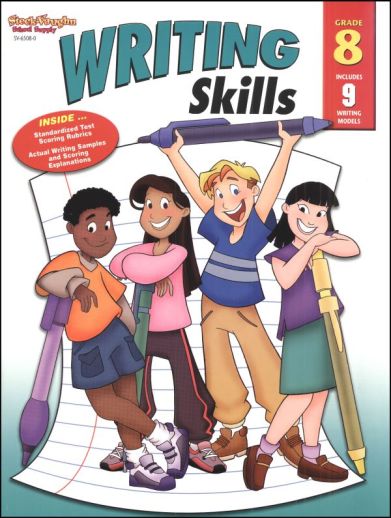We use cookies to make your experience better. To comply with the new e-Privacy directive, we need to ask for your consent to set the cookies. Learn more.
Writing Skills Grade 8
These materials contain both instruction and writing assignments but are not as broad in scope (types of writing) as the comprehensive programs.
The National Council of Teachers of English (NCTE) stresses that, "all students must have the opportunities and resources to develop the language skills they need to pursue life's goals and to participate fully as informed, productive members of society." This series aims to bring about those opportunities and have the resources available for students to practice language skills of different types. The 3rd, 4th, and 5th grade books each have six units, while the 6th, 7th, and 8th grade books have nine units. While the way things are taught in the books is pretty much the same, there are a few more topics covered in the older three books. Topics in common are personal narrative, descriptive story, how-to paper, alike and different paper (or compare and contrast), a short report, and the answer key. One subject only in the lower grade books is a type of narrative - the fable - and the topics specific to the older grade levels are autobiographical sketch, persuasive letter, persuasive movie review, and persuasive essay. There is a lot of helpful info at the beginning of the books such as the Scoring Rubric for writing, a Writing Conference (which is like a helpful evaluation sheet), a section of diagnostic writing prompts, sample narratives, sample how-to papers, sample persuasive papers, proofreading marks, the writing process, and different types of writing. In each of the six/nine units, a different type of writing is covered, and the work is done in seven stages.First, student's read a model paper, next they respond to the model paper, and then they analyze the model paper. After studying the model paper, they get the writing assignment for that unit, which includes a graphic organizer. They then do their first draft, and once that is complete, they revise the draft and then evaluate their own or another student's writing with the provided writing report card. It is a very straight-forward program for learning about these different writing styles, and the questions in the activities will really help draw the students into their work. Answers are included in these consumable and reproducible workbooks. 64-96 pages, pb, 8½" x 11". ~ Zach
| Product Format: | Softcover Book |
|---|---|
| Brand: | Steck-Vaughn |
| Grade: | 8 |
| ISBN: | 9780739865088 |
| Length in Inches: | 11 |
| Width in Inches: | 8.5 |
| Height in Inches: | 0.125 |
| Weight in Pounds: | 0.53 |

